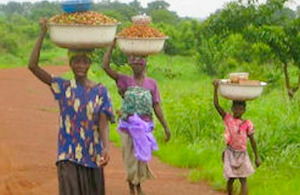DFID Research: Time is money for poor rural travellers
Study looks at the time and cost benefits of improved transport in developing countries.

Women and children in rural Ghana walking to work
The concept that “time is money”, first popularised by founding father of the US, Benjamin Franklin appears more relevant than ever in our busy modern age. Many of us living in developed nations are made aware every day that time is a valuable commodity, and any time not in work and paying the bills or in much needed leisure is time wasted. One of the biggest wastes of time is spent in travel between home and places of work, with lengthy commuting having a big impact on Western worker’s work and life habits.
If you thought that people in poor rural areas in developing countries had all the time in the world, you would be wrong. Researchers funded by DFID at IT Transport Ltd have looked at the time and cost benefits of improved transport in Ghana, Tanzania and Bangladesh and have seen major savings.
Travel time savings are a major benefit of transport improvements in developed countries but they are generally ignored by policy makers for rural travellers because of perceived difficulties in putting a value on savings and an assumption that any savings are low. This study has shown that reducing travel time in developing countries also allows the rural poor more time for work and leisure. The study also looked at when travellers would be willing to pay for transport, and found that those in formal employment, and operating a business were most willing, as were men, who generally had more money. Willingness to pay was lowest in the poor and in women, regardless of the benefits the travel might provide.
The researchers hope that the findings of the study will allow those people who plan transport improvement projects better understand the real benefits of any proposals to the rural poor.
More information
See DFID project records for The value of time study in least developed countries and The value of time in least developed countries: The African studies